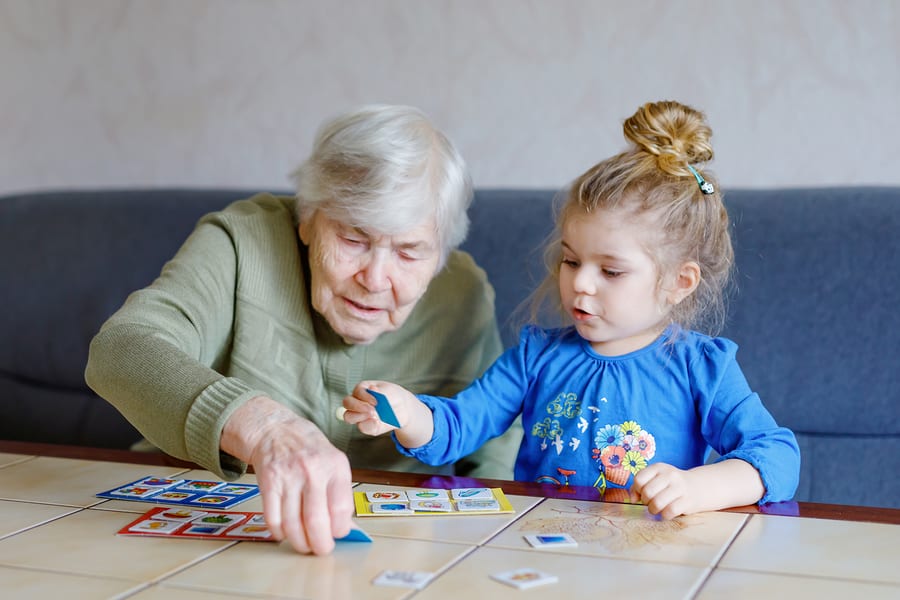When your loved one starts showing signs of Alzheimer’s disease or dementia, it can be a difficult time for the whole family. Your children may have a hard time dealing with the fact that their grandparent may not remember them at all. This article will help you understand what Alzheimer’s disease is, and how to talk to your children about it.
What is Alzheimer’s Disease?
Alzheimer’s disease is the most common form of dementia. Dementia refers to a progressive brain disease that slowly ruins the memories and one’s thinking skills. Often, the disease starts 5 to 10 years before symptoms appear. As the disease progresses, your loved one will continue to forget more. In advanced stages, symptoms include confusion, mood swings, and behavior changes. Eventually, they will be unable to care for themself, or even perform basic life tasks. Alzheimer’s progresses until it is fatal. Alzheimer’s disease has no cure, as of right now. It is the third leading cause of death in America. Approximately 5.7 million Americans currently have Alzheimer’s disease.
Complicated Feelings from Children
Children will often go through feelings of grief and sadness from their loved one’s diagnosis. They may be curious about how Alzheimer’s disease occurs. Children and teens can often feel confused or upset that their loved one doesn’t recognize them anymore. For advanced cases of Alzheimer’s a grandparent may think that grandkids are their parents; because they assume that they are much younger than they are. Your children may get frustrated at your loved one; because they have to repeat themselves or keep explaining who they are. Kids may be unsure of how to behave with that loved one now. Young children may become annoyed at the amount of attention their elderly family member is receiving now.
Talking to Your Children
It is important to talk with your children and help them understand what Alzheimer’s is; and how they need to communicate differently with someone who is suffering from this disease. Kids may also become afraid that you or other family members may develop Alzheimer’s. While there are many components around what causes the development of this disease, you are at a higher risk of developing Alzheimer’s if a family member had it. While this may be scary, it is important to communicate with your children about that. Because of the word “disease,” some children may be afraid that they will catch it. You should communicate with them that Alzheimer’s disease is not contagious.
It is also good to inform them that those with continued lifelong learning and brain development helps reduce the risk of developing Alzheimer’s disease. Puzzles, crosswords, and other brain-strengthening games can help keep the brain healthy.
Teens and Alzheimer’s
Teenagers may have an easier time grasping the gravity of what grandma’s Alzheimer’s disease means for the family. Having a close family member develop dementia can add a lot of stress to their lives, especially if they were close to that family member. But, it can also help them learn to be a caregiver. Some teens may find a sense of purpose from helping a grandparent who is suffering from dementia. On the other hand, some teens may feel embarrassed by their loved one’s condition. They may also lash out because their family member now requires more attention. It is important to help your teen through this difficult time.
Activities Children Can do With a Person With Dementia
Children can still do activities with their loved one. This can help them feel closer to this family member, despite the current situation. Help your child bake cookies with your loved one. Your child could help their grandparent do a puzzle together. Looking through pictures or making a scrapbook can be a nice way to help your loved one look back at their life, even if they can’t fully remember events. Watching reruns of old TV shows with them can make your loved one feel more comfortable.
You should encourage your children to participate in outdoor activities with your loved one. Working in the garden or taking a walk around the block can be good for both your child and your parent.
Alzheimer’s Disease and Home Health Aides
The development of Alzheimer’s Disease or other forms of dementia is often a point where families decide to hire a Home Health Aide for their elderly family member. A certified home health aide can help your loved one daily; but they can also help you and your family understand how to help your loved one; and how to communicate with them better, given their condition.
Safe Harbor Healthcare Services does not provide medical or healthcare advice via articles. This material has been prepared for informational purposes only, and is not intended to provide, and should not be relied on for medical advice.
Safe Harbor Healthcare Services has been providing excellent home care on Staten Island since 1967. Our services help the elderly and disabled live safely and independently; while giving their families the peace of mind they need. For more information, contact Safe Harbor by clicking here, or call us at (718)-979-69

